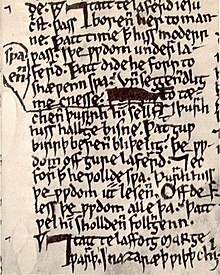Ormulum
The ormulum or orrmulum is a work of biblical exegesis written in Middle English verse around 1200 by an English monk named Orm (or Ormin) . The current meaning of the ormulum is mostly seen in research mainly in Orm's attempt at an orthography based on the English pronunciation of the time , less in the content of the work. Orm's consistent phonetic spelling approach is of great value to linguistics . It is also seen as the first attempt at English spelling reform .
author
Little is known about Orm. He mentions his name in two places in his work, once as Orrm and once as Orrmin . The name Orm is of Old Norse origin meaning worm , snake or dragon and was widespread in the Danelag area. In the dedication, Orm addresses a Walter who was both his biological brother and friar (probably in the Arrouaise order , which followed the Augustine rule) and who commissioned the work. Orm's dialect is assigned to the East Midlands . Based on the fact that the ormulum also contains sermons dealing with Saints Peter and Paul , it is believed that Orm belonged to Bourne Abbey in south Lincolnshire , the only Augustinian monastery in the East Midlands dedicated to these saints . The fact that Orm himself wrote his name Orrm or Orrmin and the title of his work Orrmulum can be traced back to his phonetic orthography, which consistently doubled consonants to mark preceding vowels as short.
manuscript
The Ormulum is obtained only in a single, incomplete manuscript, which is in the Bodleian Library in Oxford is (MS Junius 1) . Of the approximately 80,000 verses it was supposed to contain, only about 10,000 have survived, or 32 of the 242 sermons in the table of contents. Probably the ormulum was not completed; it is also considered certain that parts were lost later. It was written in compact hand on poor quality parchment . In the Cambridge History of Medieval English Literature , English scholar David Lawton writes that the manuscript, apparently written on remains of parchment, testifies to isolation and disdain even in Orm's own monastery.
Content and rating
The ormulum , containing paraphrased Gospel texts with extensive commentaries, was intended to be an aid to priests who were not used to reading English texts and to give them a confident pronunciation while preaching. For this purpose, Orm developed a consistent spelling that used different accents and special letters in addition to doubled consonants. This led to spellings like (…) forr he ne mayy nohht elless / Onn Ennglissh writtenn rihht te word (…) (from Orm's request to copyists to copy the book faithfully).
The “strange mixture of the harmony of the gospels and the collection of sermons” is often ridiculed in literary history. The Anglicist Theo Stemmler writes that the ormulum is illegible due to the “monotony of the fifteen-syllable, non-rhyming septa that are always built in the same way and the relentless pedantry of the author” and describes it as a “curious, even monstrous work”. David Lawton writes of the “frightening loquacity” of the work, but Orm has edited his material carefully and his views could often be well received by a modern readership. He treats the relationship between Judaism and Christianity in a way that is unusually free from "vengeful arrogance". Lawton concludes that aside from Orm's orthography, nothing justifies his reputation as an eccentric . In some respects Orm's work can be compared with the work of other authors, especially that of Ælfric Grammaticus .
Orm's orthographic system was not adopted by anyone. The linguist David Crystal attributes this to the fact that it was neither easy to read nor efficient to write, as the word length increased dramatically. It would have taken writers much longer to write texts in Orm's system. His basic idea, however, was reasonable; The doubling of consonants can be useful, for example, to differentiate between hoping (hoping) and hopping (hopping).
Web links
- The Orrmulum Project . Nils-Lennart Johannesson, Stockholm University.
Individual evidence
- ↑ Orm ( English ) In: Encyclopædia Britannica . Retrieved November 6, 2013.
- ↑ Patrick Groff: Why there has been no spelling reform . In: The Elementary School Journal . vol. 76, no. 6 , 1976, p. 332 , JSTOR : 1000406 .
- ↑ a b Nils-Lennart Johannesson: About Orm ( English ) In: The Ormulum Project . Retrieved May 1, 2017.
- ^ David Lawton: Englishing the Bible . In: The Cambridge History of Medieval English Literature . Cambridge University Press, Cambridge 1999, ISBN 0-521-44420-9 , pp. 466 .
- ↑ a b Thomas Hahn: Early Middle English . In: The Cambridge History of Medieval English Literature . Cambridge University Press, Cambridge 1999, ISBN 0-521-44420-9 , pp. 86 .
- ↑ a b Theo Stemmler: The English literature . In: New Handbook of Literary Studies. European high Middle Ages . Athenaion, Wiesbaden 1981, ISBN 3-7997-0768-9 , pp. 518 .
- ↑ a b c d David Lawton: Englishing the Bible . In: The Cambridge History of Medieval English Literature . Cambridge University Press, Cambridge 1999, ISBN 0-521-44420-9 , pp. 464 .
- ^ David Crystal: Spell it out: the singular story of English spelling . Profile Books, London 2013, ISBN 978-1-84668-568-2 , pp. 53 .
- ^ A b David Crystal: Spell it out: the singular story of English spelling . Profile Books, London 2013, ISBN 978-1-84668-568-2 , pp. 54 .
